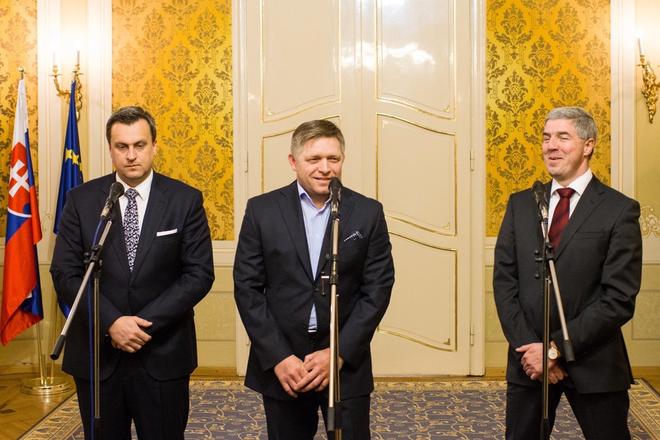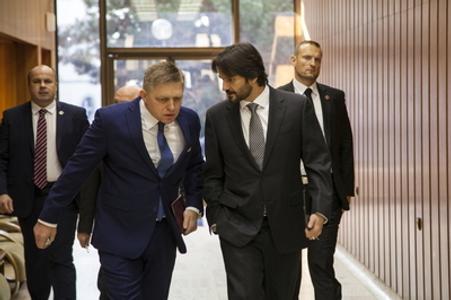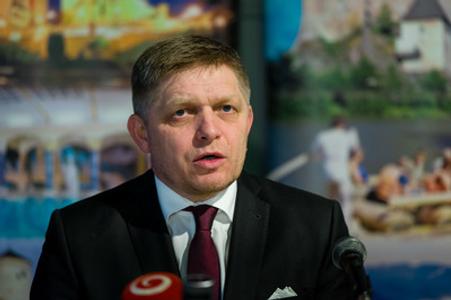In the wake of mounting public pressure, the ruling coalition has come up with a solution on how to scrap the controversial amnesties of former prime minister, Vladimír Mečiar. His current successor Robert Fico, who was previously against abolishing the amnesties, is satisfied with the proposed solution, which he called the constitutional way.
Mečiar granted the amnesties in 1997 as acting president. The amnesties concern the suspected crimes connected with the abduction of the son of the late President Michal Kováč in 1995, and the murder of Robert Remiáš in 1996.
Two decades after the amnesties were granted, Fico and his partners have now come up with a constitutional amendment that they believe will make abolishing the amnesties legal.
“We consider this decision to be in line with the Constitution and the constitutional traditions, we refuse to pass such important decisions in a way that could spark doubts in the future about the constitutionality of what the government and the parliament are doing,” Fico told journalists as he presented the proposal.
Fico pledged that all the MPs of the ruling coalition will vote in favour of the changes, but remarked that the constitutional change will also require the cooperation of the opposition.
Qualified majority proposed
The new rules should allow the parliament to cancel the amnesties if at least one fifth of the 150 MPs signs the proposal to do so, and subsequently at least three fifths of the plenum vote in favour of the proposal.
Additionally, the Constitutional Court will be automatically required to rule within two months on the validity of the parliament's decision.
The cabinet discussed the change to the Constitution, which they are seeking to pass on March 15 in a short-tracked legislative process, in addition to the proposal to scrap the Mečiar amnesties, and the amnesty of former president Michal Kováč for his son.
SNS head and Parliamentary Speaker Andrej Danko believes the proposal to be a compromise.
“[This solution] has very sensitively concocted the very essence that can solve all the remarks, all the attitudes of anyone who decides on such a complicated matter,” Danko said.
Consequences?
“Criminal prosecution bodies will get the green light,” Fico said.
Scrapping the amnesties in the parliament will also automatically mean cancelling all the steps that criminal prosecution bodies have taken, for instance, to stop the criminal prosecution due to amnesties, Béla Bugár of Most-Híd said. He represents the only party in the coalition that has been in favour of abolishing the amnesties in the long run.
Investigators believed that the boss of the country’s SIS intelligence service, Ivan Lexa, masterminded the abduction and Lexa subsequently faced several serious criminal cases including abduction, sabotage, robbery, treason, misuse of power and other white-collar crimes.
Lexa was also accused of involvement in the murder of Robert Remiáš. He was alleged to have done this to prevent witnesses from testifying about Kováč Jr’s abduction to Austria in 1995.
However, Lexa was ultimately shielded from the most serious charges against him by the Mečiar amnesties. These were revoked by Mečiar’s successor as acting president, Mikuláš Dzurinda, but after Lexa’s subsequent detention, the European Court of Human Rights in 2008 ruled in Lexa’s favour, effectively reversing the revocation and re-imposing the amnesties.
Endless debate might now end
There have been seven attempts to do away with the amnesties linked to events that happened 20 years ago, the first one immediately after the government of Mikuláš Dzurinda took office following the 1998 election that toppled Mečiar’s rule in Slovakia.
There is also another proposal to scrap the amnesties currently in the parliament, proposed by opposition MP and former prominent figure of the Velvet Revolution in Slovakia, Jan Budaj.
Yet Robert Fico, who is a lawyer and who ruled the country together with Mečiar’s HZDS party (now obsolete) and the Slovak National Party (SNS), which is also part of the coalition today, has until now insisted that scrapping the amnesties would be unconstitutional, and legal nonsense.
The SNS, which also partnered with HZDS in the coalition in 1997, has held a similar opinion.
The debate surrounding the Mečiar amnesties has always been more or less intensively present in the Slovak public, but there has never been enough political consensus on scrapping them. Recently, the topic has returned to the public discourse with a new intensity, first in the autumn of 2016 when President Kováč died, and now with the movie about the abduction being screened in cinemas around Slovakia.
There has even been a petition signed by more than 66,000 people, calling on the government to scrap the amnesties. Prominent lawyers have also issued a statement with a similar call.
Based on the Focus polling agency poll from February this year, 63 percent citizens of Slovakia would like to see the amnesties cancelled.






